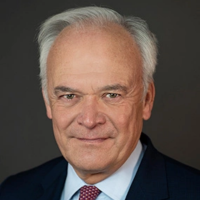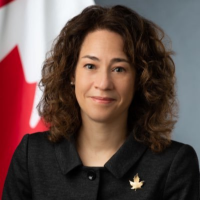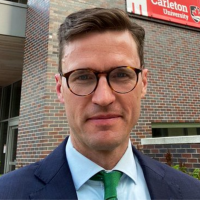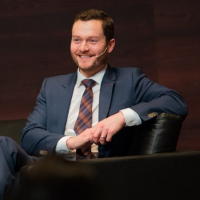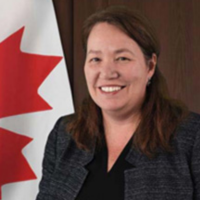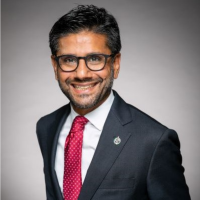
Firdaus Kharas
Chairman & Executive Producer - Chocolate Moose Media Inc
Chairman and Executive Producer, Chocolate Moose Media
Master of Arts, International Affairs (’80)
When the United Nations and other nongovernmental organizations identify an intractable communication problem somewhere in the world, they frequently call Firdaus Kharas.
His approach to urgent, sometimes deadly crises is deceptively simple: he creates animated public service announcements and videos that resonate with people across cultures.
“I try to appeal to the commonalities we have as human beings,” explains Mr. Kharas, who has tackled subjects such as domestic violence, childhood diabetes, Ebola treatment and Zika virus prevention. “I choose projects that are oriented towards improving or saving lives.”
Perhaps Mr. Kharas’ most famous campaign is “The Three Amigos”, which features three animated condoms discussing HIV prevention. It was introduced on South African television channels during the height of the AIDS crisis in 2005. Condom sales more than tripled and Mr. Kharas was credited with saving 18,000 lives in a year as a result.
“HIV was a death sentence at the time, but the South African government wasn’t acknowledging the problem or dealing with it,” says Mr. Kharas, who won dozens of awards including a Peabody Award for the campaign. “The ad was played in four African languages and displayed on buses, trains, jumbotrons, in doctors’ offices and at every university in the country.”
He says the desire to do good in society was a path “that was always clear to me.” He vividly recalls visiting Mother Teresa’s clinic in his hometown of Calcutta with his mother, who was the head of a nongovernmental organization, when he was 8-years-old.
“I grasped then the importance of living and working outside of one’s comfort zone for the benefit of others,” he told a Carleton University audience in 2015, after receiving an honorary doctorate.
After spending his childhood in Calcutta, Mr. Kharas attended high school in Pennsylvania as an exchange student. He stayed in the U.S. for his undergraduate studies and considered attending Harvard for a master’s degree in international affairs. But John Sigler, a former director of the Norman Paterson School of International Affairs, convinced him to come to Carleton in 1979.
“It was a very brief conversation,” recalls Mr. Kharas. “He offered me a full scholarship and that changed the course of my life. I became Canadian.”
Mr. Kharas went on to study marketing and law at the University of Ottawa, management at Harvard University and social innovation at Stanford University. He headed the United Nations Association and spent six years in the Canadian public service—both in foreign affairs and with the Immigration and Refugee Board of Canada—before leaving in 1995 to create Chocolate Moose Media.
“When I told people that I was going to start a ‘hybrid’ company that would use for-profit media work to fund nonprofit media for social change across many cultures and that I would give it away for free, more than one international affairs expert gave me a highly quizzical look,” he recalls. “But this reflects what I was doing in international affairs, just with different means.”
Mr. Kharas’ company’s first campaign was for UNICEF, in which UNICEF animated each part of the UN Convention on the Rights of the Child using studios all over the world. He recognized there was a need to not just educate people, but change their behaviour.
“I don’t believe in bashing people on the head with information,” he says. “My approach with animation is that it’s funny, it’s viewed repeatedly and people internalize the message and come to their own conclusions.”
Mr. Kharas’ most recent project involves creating animated shorts about the teenagers who are among the 600,000 Colombian refugees living in Ecuador.
“They’ve gone under the radar of much of the world and these teens feel discriminated against. We want to help increase their sense of self-worth and self-esteem,” he says.
As he spoke to graduates at Carleton University in 2015, Mr. Kharas told them to follow their passion and “don’t let anyone stop you.”
“If you have the talent to make a difference—if you can save the life of one child—that is your duty,” he argues. “At the end of it all, I’m just trying to save one life.”


